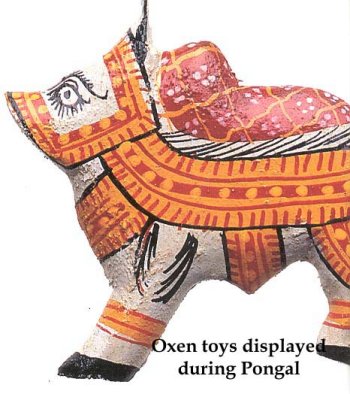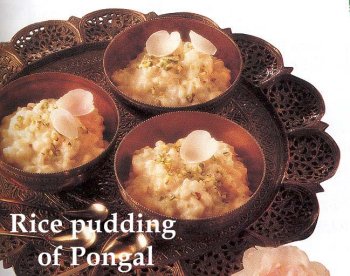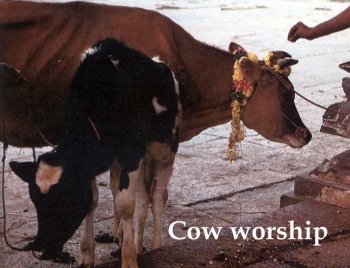 Pongal is the most important festival of south India, particularly for the
Tamilians.
It falls in the month of January. It is
a harvest festival honoring the sun god (Surya) and the god of rain
(Indra). Both these gods help the farmer to produce a plentiful harvest
of paddy during the mild winter months in the south of India.
Pongal is the most important festival of south India, particularly for the
Tamilians.
It falls in the month of January. It is
a harvest festival honoring the sun god (Surya) and the god of rain
(Indra). Both these gods help the farmer to produce a plentiful harvest
of paddy during the mild winter months in the south of India.
Several days prior to Pongal, people clean up
their houses and exchange old utensils for the new ones, similar to North Indian
tradition, prior to Diwali.
The festival is observed for three days. The first
day, called Bhogi Pandigai, (January 13) is dedicated to Lord
Indra (also called Bhogi). People take special bath, messaging
their body with til (sesame) oil. A bonfire is set up in the evening,
burning their old mats. Young children beat drums as hard as they can and dance
around the fire. Members of the
families gather around the bonfire as part of the celebration.
The main part of the festival falls on the second day
(January 14: Makar Sankrant) when the sun is devoutly worshipped. A sweet
pudding is made with milk and freshly harvested rice. The pudding is offered to
the gods as a symbol of thanksgiving. The word “pongal” means,
“overflowing.” The common greeting on this day is “Paal pongrita?” which
means, “Did the boiling milk overflow?” The overflowing milk with rice is
symbolic of wealth and prosperity.” Fresh Rangoli, a geometrical design,
are made with dry rice powder or any white powder, on the floor, outside the
entrance of the house. This symbolizes welcoming the Gods. The festival ends
with a grand lunch. Outsiders are not invited for the lunch; only those who live
under the same roof partake of the feast.
The third day is the day when people worship cattle.
They are washed and decorated with flower garlands and offered a little bit of
the rice pudding too. It is symbolic of acknowledging their hard labor in
tilling the field.
 Boat races are held in different parts of the country
on the third day, which are heavily attended by the supporters of their chosen
team. In some parts, wild bulls are
leased on a track with paper money hanging as a garland round their neck. Young
boys dare to take the money from the bull’s neck. It is dangerous but
challenging and great fun.
Boat races are held in different parts of the country
on the third day, which are heavily attended by the supporters of their chosen
team. In some parts, wild bulls are
leased on a track with paper money hanging as a garland round their neck. Young
boys dare to take the money from the bull’s neck. It is dangerous but
challenging and great fun.

![]()